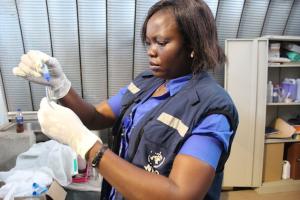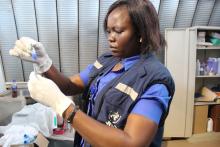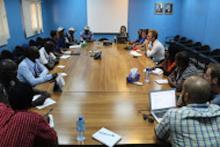Enhanced preparedness and surveillance may reduce magnitude of cholera in South Sudan
Juba, 17 June 2015 -- WHO has been assisting the Ministry of Health to step up both preparedness and surveillance for cholera in order to avoid a potentially large-scale outbreak.
“So far our efforts have been effective as evidenced by how prompt the suspected cases are being reported and tested,” says Dr. Allan Mpairwe, Head of Outbreaks and Disaster Management (ODM) at WHO in South Sudan.
To date, one cholera case has been confirmed in Juba, South Sudan. The case, confirmed on 1 June 2015, was reported from UN House Protection of Civilians (PoC) sites, where more than 28,663[1] internally displaced persons (IDP) are currently housed since the current humanitarian crisis started in December 2013.
In February, 43 cases and three deaths were reported in Ikotos County, Eastern Equatoria State. However, the outbreak was swiftly contained through a multisectoral approach that included enhanced water, sanitation and hygiene (WASH) and improved social mobilization.
In comparison, the outbreak that resulted in 6,421 and 167 deaths, with a case fatality rate (CFR) of 2.6% in 2014 was reported in May 2014, prompting the Ministry of Health to declare an outbreak on 15 May of that year. By June 2014, more than 1,000 cases and over 25 deaths had been reported in two states of Central Equatoria and Upper Nile.
“We are certainly better prepared to avert major outbreaks this year compared to last year as we have embarked on pre-emptive measures. We hope these efforts will help to prevent cases,” Dr. Mpairwe says.
Pre-emptive measures undertaken include updating cholera contingency plans at both national and state level before the onset of the rainy season which begins in April up to November. In addition, diagnostic test kits and supplies for managing cholera were pre-positioned in the states before the rainy season set in. Further, WHO has begun a series of Oral Cholera Vaccination (OCV) Campaigns in parts of South Sudan in concerted efforts to prevent a potential outbreak of the disease.
The campaigns, targeted for Bentiu and Juba 3 Protection of Civilians (PoC) sites in June 2015, aim to prevent more cases and will complement other measures already in place. This is crucial given the approach of the rainy season in the endemic country.
“The threat of a cholera outbreak in the PoCs and other high risk areas is imminent hence it is imperative to implement effective cholera prevention interventions. While numerous preventive measures have been put in place, they may not be adequate to avert a potential cholera outbreak in the PoCs, which is why health partners decided to use OCV as supplementary preventive strategy,” Dr. Mpairwe explains. The campaign in Bentiu began on 1 June and reached 69,757 or 95% of the targeted 73,360 people above the age of one year with the first dose of the oral cholera vaccine (OCV) over a four day period. The second round is scheduled for 22 June. A similar campaign in Juba is scheduled for 22 June and aims to reach 33,565 people over four days. A total of 146,720 doses of the vaccine have been released for Bentiu, while another 67,129 have been set aside for Juba 3 PoC.
Following the confirmation of the case, the Ministry of Health working with WHO, UNICEF, health and WASH cluster partners, has reactivated the national cholera taskforce. Sub-committees of the taskforce have also been formed. These include the Case Management and Laboratory; Coordination and Logistics; WASH and Social Mobilisation and Communication to ensure an effective multi-sectoral response.
The committees will also work to enhance capacity for early identification of cases; management of cases; access to safe water, sanitation and hygiene; and educate the public about prevention among other activities. A comprehensive social mobilization and communication strategy has been drawn up to reach a diverse audience through a variety of approaches.
Temporary cholera treatment centers have been established in Juba Teaching Hospital and the International Medical Corps (IMC) clinic in UN House PoC to manage suspect and confirmed cholera cases. The Health Cluster has mobilized necessary requirements for a cholera treatment centre in UN House PoC in the event of a full-scale outbreak.
The Ministry of Health is advising the public to take measures to avert the spread of cholera and to report any suspected cholera patients to the nearest health facility. A toll-free mobile phone line has been dedicated for receiving cholera alerts.
Cholera is endemic in South Sudan and historically, outbreaks have occurred along major rivers in the dry season as well as during the rainy season. South Sudan has suffered at least five major cholera outbreaks in 2006, 2007, 2008, 2009 and 2014.
[1] UNMISS PoC Update No. 78, 15 June 2015.
______________________________________________
For more information, please contact:
Matilda Moyo | Communications Consultant | WHO Surge Team
Mobile: +211 955 036 439 | Email: whossinfo [at] gmail.com (whossinfo[at]gmail[dot]com) or matilda.moyo [at] gmail.com (matilda[dot]moyo[at]gmail[dot]com)
Below:
1. WHO South Sudan Laboratory Scientist, Jane Pita, conducts a rapid test on a specimen during a cholera investigation.
2. WHO South Sudan Public Health Officer Dr. Julu (left) Louis and Epidemiologist Dr. Joseph Wamala conduct an interview during a cholera investigation. Photo: WHO/M.Moyo.
3. WHO South Sudan Epidemiologist, Dr. Joseph Wamala, conducts an interview during cholera investigation. Photo: WHO/M.Moyo.
4. Partners at the PoC meet regularly to share information and strategise on prevention and response to a potential cholera outbreak.
Photo credits: WHO/M. Moyo







